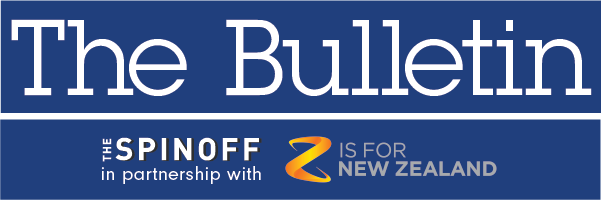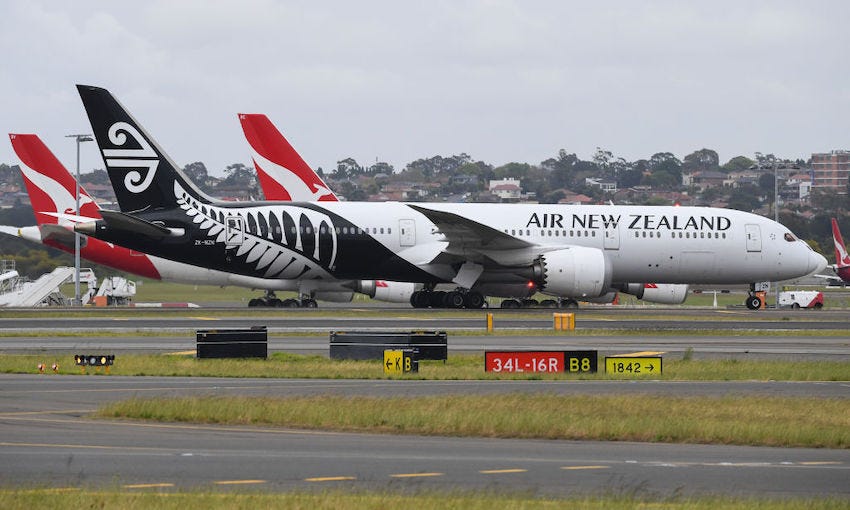Covid positive person spent weekend in Wellington
Everyone on their flights in and out of Australia is being asked to self-isolate by Australian authorities
Good morning and welcome to The Bulletin for Wednesday 23 June, by Alex Braae for The Spinoff. Presented in partnership with Z Energy.
In today’s edition: Covid positive person spent weekend in Wellington, new plan aimed at protecting Hauraki Gulf announced, and a billion set aside for housing infrastructure fund.
Image: The person flew Qantas on the way into Wellington, and Air NZ on the way out (James D. Morgan, Getty Images)
A person who later tested positive for Covid-19 travelled to Wellington from Sydney over the weekend. As always in these situations, it's a good idea to monitor the locations of interest list, which will be added to if and when tracing data comes in. The NZ Herald reports the health ministry in NZ has confirmed the person who since tested positive came through New Zealand, and that this is the first time this has happened since the opening of the travel bubble. And in Radio NZ’s news bulletins this morning, it was reported four close contacts have been identified and are isolating. Note – to date, there have been no community cases detected in New Zealand over the period. The key questions for the initial stages of the response will be:
What the individual got up to during trip
Whether the person was symptomatic
What stage of incubation they were at
And whether the person was tracking their movements
On the flights, everyone who flew on QF163 to Wellington on June 19, and NZ247 to Sydney on June 21, is being required by Australian health authorities to isolate immediately for 14 days. A NSW Health alert, reported on by 7News, said that everyone on those flights is considered a close contact of a confirmed Covid case. In the meantime, a full list of NSW locations of interest can be found here. Genome sequencing is taking place in Australia to find out more about the case.
Meanwhile, the travel bubble with New South Wales has again been paused, due to cases in the community in Sydney. Our live updates from last night reports it will initially be in place for 72 hours, but also be under "constant review". A release from Covid-19 minister Chris Hipkins said the government was taking a "precautionary approach", and the risk to New Zealand was deemed low. By my count, this is the fifth time the bubble has been paused since it came into effect almost exactly two months ago.
And on it all, it's worth noting that most of this next piece was written before this emerged. But as Toby Manhire wrote, we are at risk of a Sydney-style outbreak, and not initially being in a good position to trace it. Nor would any potential outbreak be halted by the vaccination campaign yet, which has still only reached a small proportion of the population. If the person who came to New Zealand had the delta strain, then it could be particularly serious because of the higher virulence. This ABC story gives an example – a "scarily fleeting" encounter involving people at a Bondi Mall walking past each other now believed to be part of a chain of transmission.
With the Hauraki Gulf ecosystem at risk of collapse, a new strategy has been launched to try and limit the damage. Stuff reports it includes 18 new protected areas, and restrictions on trawling into "corridors". Environment minister David Parker said the Gulf was under pressure, and "we need to take action to ensure it can be enjoyed by current and future generations.” Pare Hauraki leader Paul Majurey welcomed the announcement, reports Te Ao News in a story that also touched upon the implications the strategy might have for customary iwi rights.
For context, the Hauraki Gulf ecosystem is in a terrible state. This piece from NZ Geographic publisher James Frankham gives details on just how bad. In fact, seeing the state of the Gulf pushed the publication into a stance of advocacy, which they don't normally do, arguing that urgent political action was needed to prevent total collapse. An example of one of the points raised, to give you a sense of it all: "There have been ten mass mortality events of fish and shellfish in the gulf in the past ten years—largely relating to adverse environmental conditions—and nine toxic algal blooms in the nine years 2000-2019."
A panel of experts recommended that at least 30% of the Hauraki Gulf needed to be put into marine reserve. It does not appear that yesterday's strategy will come close to achieving that. So while they see it as a generally positive move, the Hauraki Gulf Forum is warning that much more will need to be done. In particular, the Stuff story noted fishing methods like dredging have not been banned, even though that practice causes serious damage to the sea floor.
The government will set aside a billion dollar contestable fund for councils, iwi and residential property developers to build infrastructure to support housing development. Interest reports the money comes out of a previous $3.8bn housing announcement. Minister Megan Woods said the priority of the fund will be weighted towards large developments, affordable housing, and the parts of the country with the highest need. Stuff reports National are warning that the actual spending of the fund might end up bogged down in bureaucracy, rather than going towards new development.
Become a member today to help us analyse and uncover the new New Zealand. Click here for more information on how you can support The Spinoff.
There has only been a brief mention of the flooding around the East Coast so far in The Bulletin, but the damage is pretty severe. Alice Angeloni from the Gisborne Herald has looked at the effects on Tokomaru Bay, where a local reported floodwaters swept a caravan and a shipping container away from their property. Meanwhile the Hatea a Rangi kura had to be closed so that staff and volunteers could clean up, after a "torrent of water" went through classrooms.
Following up on yesterday's roundup of a lack of improvement in mental health facilities: The NZ Herald's (paywalled) Alex Spence reports scarce beds for acute patients are being taken by overstaying patients – but crucially, many are staying longer because of a lack of available community housing. Meanwhile, minister Andrew Little has declared himself "extraordinarily frustrated" that a massive chunk of money announced in the 2019 budget for acute facilities still hasn't been spent, reports Stuff.
Media organisation Newsroom has pleaded not guilty to a criminal charge of allegedly identifying a vulnerable child involved in an Oranga Tamariki uplift. In a report published on the site, Newsroom noted that the whānau involved in the story have never made a complaint – rather the charges have been brought by the Solicitor-General. The organisation disputes that the child could be identified from their video story.
Got some feedback about The Bulletin, or anything in the news?
Get in touch with me at thebulletin@thespinoff.co.nz
Right now on The Spinoff: Ezra Whittaker and Josie Adams have a beautiful visual piece about how climate change is already affecting New Zealanders. Charlotte Muru-Lanning explains what is behind an occupation at Pūtiki Bay, Waiheke, which last saw clashes between protesters and police. Justin Latif writes about a business accelerator that is changing how South Aucklanders think about local cuisine. Emily Writes tries to review a book about sleep, and meditates on what keeps her awake. And Sam Brooks tests the local credentials of A Love Yarn, a new romantic comedy set in one of the woolier parts of New Zealand.
One of the things that's really good about The Spinoff (in my opinion at least) is that we give our people a lot of room to be themselves in their writing. So for a feature today (and once a week for the next month) we're going to use this slot to introduce some of our people a bit more. The work that we do is made possible by everyone who is a Spinoff Member, because it means we're ultimately accountable to our readers to produce quality above all else. Here's Ātea editor Leonie Hayden on the work she's most proud of:
What I love about The Spinoff is that it was born with Te Tiriti baked into its DNA. All our editors and managers know that mana whenua and Māori perspectives are central to every single kaupapa; that the western, male lens is no longer paramount, and never should have been. Equity in media means constantly questioning the status quo, and a commitment to relearning all the time. Patting yourself on the back for including one Māori voice isn’t going to cut it. On the daily, The Spinoff platforms perspectives that have been missing from public discourse for, oh I don’t know, 200 years, including diversity of thought within te ao Māori. Frankly, I have seen the profound influence we’ve had on the wider media landscape, and it’s something I’m very proud of.
The best thing is our readers and members get it too. So many of you have told us you support The Spinoff because you feel seen. I can’t think of a greater compliment or motivation to keep going. He aroha whakatō, he aroha puta mai. - Leonie Hayden, Ātea editor
The Spinoff's journalism is funded by its members – click here to learn more about how you can support us from as little as $1.
Weightlifter Laurel Hubbard has been selected to represent New Zealand at the Olympics, and in doing so will become the first transgender person to compete at the games. The participation of transgender women in sport is for some a contentious issue, but Hubbard's selection is entirely in line with IOC policy. As the Guardian reports, the news was greeted by well-wishes from Hubbard's Australian rival Charisma Amoe-Tarrant, with the two women set to compete against each other in Tokyo.
And the cricket, well – we got basically a full day in, and what a day it was. The game moved forward a long with, with New Zealand gaining and then losing the lead. Heading into the final day, it's fair to say all three results are still possible, but an early flurry of wickets for New Zealand and things will get very interesting. Keep an eye on the latest episodes of The Offspin, we'll be recording a new one very shortly.
That's it for The Bulletin. If you want to support the work we do at The Spinoff, please check out our membership programme.







